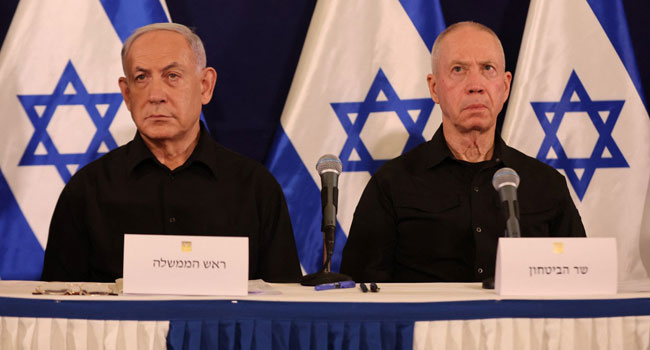Israel’s Cabinet to Meet on Ceasefire
Israel’s security cabinet was scheduled to convene Friday after finalising terms of a Gaza ceasefire and hostage release agreement, according to Prime Minister Benjamin Netanyahu’s office, with the US “confident” that the truce will begin as planned this weekend.
If accepted by Israel’s cabinet, the ceasefire agreement would go into force on Sunday and include the exchange of Israeli hostages for Palestinian inmates, following which the parameters of a permanent halt to the war would be agreed.
Aside from diplomacy, Israeli strikes killed dozens of people in Gaza on Thursday, according to rescuers, while Israel’s military claimed targeting approximately 50 sites across the enclave on the previous day.
On Thursday, Netanyahu’s office accused Hamas of breaking fundamental terms of the agreement in order to extract last-minute concessions, which Hamas disputed.
His administration announced early Friday that a “deal to release the hostages” had been reached, and he had instructed the political security cabinet to meet later that day.
“The government will then convene to approve the deal,” according to the statement.
At least two cabinet members have spoken out against the truce, with far-right National Security Minister Itamar Ben Gvir stating that he and his party colleagues would leave the government—but not the ruling coalition—if the “irresponsible” pact was adopted.
Far-right Finance Minister Bezalel Smotrich also rejects the truce, describing it as a “dangerous deal.”
However, US Secretary of State Antony Blinken, who has been involved in months of mediation attempts, stated on Thursday that he believes the truce will take place as planned.
“I am confident, and I fully expect that implementation will begin, as we said, on Sunday,” he told me.
According to Gaza’s civil defence service, Israel bombed various locations of the territory after the ceasefire was announced on Wednesday, killing at least 80 Palestinians and injuring hundreds more.
Hamas’ military wing, the Ezzedine al-Qassam Brigades, warned that Israeli strikes were endangering the lives of captives set to be released under the deal, perhaps turning their “freedom… into a tragedy.”.
The conflict was launched by a Hamas attack on Israel on October 7, 2023, that killed 1,210 persons, the majority of whom were civilians, according to an AFP assessment of official Israeli data.
During the bloodiest attack in Israeli history, Palestinian militants also kidnapped 251 people, 94 of whom are currently being held in Gaza, including 34 who the Israeli military claims are dead.
Israel’s subsequent campaign has destroyed much of Gaza, killing 46,788 people, the majority of them are civilians, according to data from the Hamas-run territory’s health ministry, which the UN considers credible.
After months of failed discussions to end Gaza’s worst conflict in history, mediators Qatar, Egypt, and the United States stepped up their efforts.
If concluded, it would halt hostilities one day before the inauguration of US President-elect Donald Trump, who claimed responsibility for the arrangement.
“If we hadn’t been involved, this deal would never have happened,” Trump said in an interview Thursday.
Envoys from both the Trump team and President Joe Biden’s outgoing government were present at the most recent negotiations, with a senior Biden official claiming that the unexpected pairing was a key component in achieving an agreement.
In Israel and Gaza, there were jubilation and sadness over the truce agreement.
Saeed Alloush, who lives in northern Gaza, claimed he and his loved ones were “waiting for the truce and were happy” until midnight attacks killed many of them.
“It was the happiest night since October 7” because “we received the news of the martyrdom of 40 people from the Alloush family,” according to him.
Pensioner Simon Patya in Tel Aviv expressed “great joy” that some hostages would return alive, but also “great sorrow for those who are returning in bags, and that will be a tremendous blow, morally.”
Qatari Prime Minister Sheikh Mohammed bin Abdulrahman bin Jassim Al-Thani announced the agreement on Wednesday, saying an initial 42-day truce would release 33 prisoners, including women, children, and the elderly, as well as civilians who were ill or injured.
During the first phase, Israeli forces will also withdraw from Gaza’s highly populated regions, allowing displaced Palestinians to return “to their residences,” he stated.
Biden stated that the second phase of the accord could result in a “permanent end to the war.”
He also stated that the agreement would “surge much-needed humanitarian assistance to Palestinian civilians and reunite the hostages with their families.”.
Egyptian President Abdel Fattah al-Sisi emphasised the “importance of accelerating the entry of urgent humanitarian aid” into Gaza.
Cairo said it was prepared to host an international conference on reconstruction in Gaza, where the United Nations estimates it will take more than a decade to repair civilian infrastructure.
In a statement issued Thursday, G7 leaders described the ceasefire agreement as “a significant development” and urged Israel and Hamas to work towards its “full implementation.”
Rik Peeperkorn, the World Health Organisation’s representative in the Palestinian territories, said on Thursday that rebuilding Gaza’s destroyed health sector alone will likely cost at least $10 billion over the next five to seven years.
The UN Palestinian refugee agency UNRWA, which faces an Israeli restriction on its activities beginning later this month, praised the ceasefire agreement.
“What’s needed is rapid, unhindered, and uninterrupted humanitarian access and supplies to respond to the tremendous suffering caused by this war,” UNRWA Director Philippe Lazzarini wrote on X.




